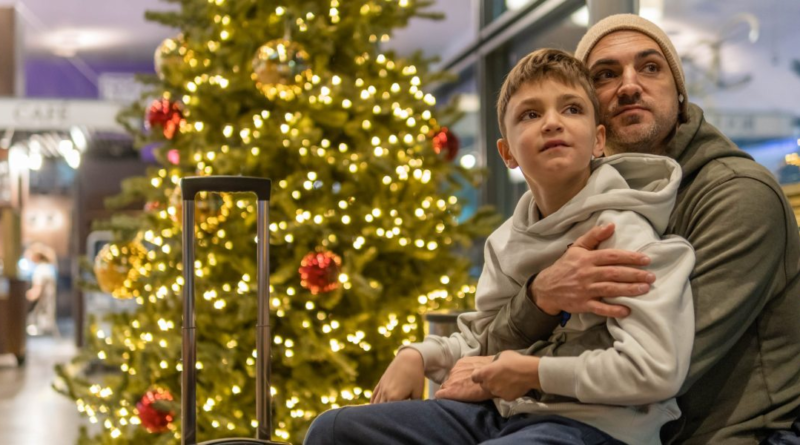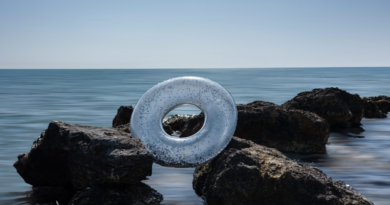6 ways to avoid holiday travel stress, stay mindful on the go, and fly with ease
‘Tis the season for festive gatherings with friends and family. It’s also the season of crowded airports, long lines, and a collection of not-so-jolly travelers.
Polls suggest the number of holiday travelers will surpass last year: More than 115 million people will travel at least 50 miles from their home between December 23rd and New Year’s Day, according to predictions from Auto club AAA.
“That desire to get away is stronger than we have seen in a very long time,” Aixa Diaz, a spokesperson for AAA, told The Associated Press. “People are willing to adjust their budgets in other areas of their life, but they want to keep traveling.”
Since the height of the pandemic, people have been eager to spend the holidays with far-away family and friends or even take solo travel during their time off. However, for many, long delays, lost luggage, unruly passengers, and the fear of contracting COVID-19 or the flu in transit make holiday travel far from glamorous. “One of these scenarios alone is enough to raise anxiety. The combination of them all could lead to debilitating levels of anxiety and panic,” Julia Baird, a psychologist and the director of clinical at Lightfully Behavioral Health, tells Fortune.
We know all too well that flight schedules and weather patterns pay no attention to the white elephant exchange promptly beginning at 6 p.m. at your childhood home. “From the ride to the airport to the hustle and bustle of security and boarding, travel can be stressful,” Dr. Jason Wersland, a chiropractor and founder of Therabody, tells Fortune.
Luckily, there are ways to minimize travel anxiety over the holiday season, prepare for the controllable, and stay mindful on the go.
Before you travel
Prepare what you can
For those of us planners, it helps to prepare for what you can. Don’t wait until the eleventh hour to begin packing—which may cause a panic in the TSA line for the forgotten toothbrush. Have your travel information in an accessible place. If you’re arriving late at night, consider locking down transportation beforehand. If it calms you down to read, listen to music, a podcast, or journal while traveling, make sure you have it packed or downloaded.
“I like to have a detailed itinerary, including times, transportation details—like how I’m getting to and from the airport—and accommodation addresses and reservation numbers,” Wersland tells Fortune. “It really helps not only to feel calmer but not having to rifle around or keep pulling my phone out to find these things on the fly.”
Adjust sleep if necessary
Traveling, especially across time zones, can affect the body’s circadian rhythm and sleep-wake cycles. For those who struggle with falling and staying asleep, it’s beneficial to prioritize sleep ahead of traveling. In the days leading up, stick to a strict wind-down routine 30 minutes to an hour before bed to calm the mind and body.
“I prefer to plan my sleep schedule in advance to minimize any jet lag or disruptions to my usual routine. You won’t find me at late-night parties or bars unless they’re essential for business purposes,” Victoria Repa, CEO and founder of BetterMe, a mental fitness company, tells Fortune about her pre-travel habits.
Stay connected to friends and family
When nervous about chaotic holiday travel, it’s easy to spiral and catastrophize before setting foot in the terminal. Just as instructed to rid the mind of intrusive thoughts or nervous feelings, lean on a friend or family member. Don’t hesitate to contact someone to distract you and help you feel connected.
“Never underestimate the power of connection,” says Baird. “Though it’s not likely to have your therapist on speed dial over the holidays, friends can provide a sounding board and crucial words of support during times of holiday stress.”
If you have time to spare while traveling over the holidays, a phone call to a close friend is a perfect way to pass the time.
During travel
Practice on-the-go mindfulness
Calming your heart rate down is essential whenever you’re in a heightened stress state. Mindfulness on the go can help you stay present during a hectic travel day.
Meditating while in transit is possible by keeping your eyes open to stay alert for anything in front of you. Start by being aware of your surroundings and where you’re sitting. If you’re waiting at the gate, notice your feet planted on the ground and your back on the seat. Stay attuned to what you see, hear, or smell. As you become mindful, take slow, deep breaths. Practice the 4-7-8 technique by breathing in for four counts, holding for seven counts, and breathing out for eight counts. Repeat this as many times as you like. You may notice a rushed traveler or hear a baby crying. Maria Gonzalez, a mindfulness meditation teacher, reminds us to let these observations pass through like a train car.
“It’s just sight and sound. I’m not judging it,” she previously told Fortune.
If you struggle to stay present, don’t be hard on yourself. Keep breathing and letting worries pass through. “You’re training yourself to constantly come back to that awareness, and it’s a very gentle thing,” Gonzalez said. “If we’re encouraging ourselves, we’re more likely to succeed.”
Stay hydrated
Staying hydrated on the go is important for our physical and mental health. Make a habit of bringing and refilling a water bottle before a flight. Staying hydrated, especially while moving around and feeling stressed, can minimize the risk of dehydration, headaches, and dizziness.
After transit
Keep your routine but don’t be afraid to pivot
After you safely get to your destination, it’s easy to fall out of the habits that instill calm in your life and are critical for the flight home. Find time, even a few minutes, for your favorite habits. If you want to continue your meditation practice, find a couple of minutes before or after a family event. If you typically go to the gym, find a place to walk outside or get exercise, for example. “Staying active on the go can keep you on track toward your goals and help you stay committed to habits you’ve worked hard to build,” Repa says.




